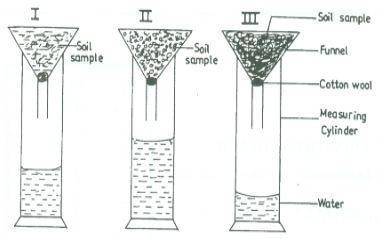Study specimens N (BONE), 0 (EGG), P (ROUNDWORM) and Q (TICK) carefully and answer the following questions.
(a) Name three industries that use each of specimens N and O
(b) State five effects of specimen P on the host. (5 marks ]
(c) State four ways of controlling specimen Q on the farm. [4 marks)
Study specimens G (GRASSHOPPER), H (BEAN BEETLE), I (BIRD), and J (RAT) carefully and answer the following questions.
(a)(i) Classify specimens G and H according to their feeding habits.
(ii) Name one part of crops damaged by each of specimens G and H.
(ii) State three ways in which specimen H is economically important. (3 marks ]
(b) State four ways of controlling each of specimens I and J
Study specimens A (RANGING POLE), B (SURVEY PIN) and C (MEASURING TAPE) carefully and answer the following question.
(a) Describe specimen A. (3 mark)
(b) State two uses each of the specimens A, B and C.
(c) State two ways of maintaining each of specimens A, B, and C

The diagram above illustrates an experimental setup to determine a soil property.
Study them carefully and answer the question that follows;
(a) Suggest a suitable title for the experiment. [1 mark]
(b) Outline the procedure for carrying out the experiment.[ 7 marks]
(c) identify the soil samples in diagrams 1, Il, and ll
(d) State two precautions to be taken when carrying out the experiment.[ 2 marks )
(e)(i) Which of the soil samples is prone to waterlogging?
(ii) Give one reason four your answer in (e)(i)
(a) Mention three print and three electronic media used in disseminating agricultural extension messages.
(b) State four advantages of group method of agricultural extension. [ 4 marks ]
(c) Explain the term assembling as a marketing function [ 2 marks ]
(d) State one symptom and two control measures of each of the following crop diseases: (i) Maize streak; (ii) Groundnut rosette. [ 6 marks ]
(a) What is agricultural insurance? [2 mark ]
(b) Explain briefly the following types of insurance policies for agricultural production: (i) Specific enterprise insurance; (ii) Fire disaster insurance; (iii) Life assurance.
(c) Discuss the process of egg formation in a hen. (10 marks)
(a) Explain briefly three systems of mating in livestock management. [6 mark ]
(b) Draw and label the digestive tract of a hen [7 mark ]
(c) Give five reasons why ornamental plants are important. (5 marks)
(a) Explain the term staking in yam cultivation (3marks)
(b) Describe the nursery practices in cocoa cultivation.
(c) State five reasons for parboiling paddy rice [ 5 marks ]
(d) State three advantages and two disadvantages of taungya farming (5 mark)
(a) What is farm surveying? (2 marks)
(b) State four disadvantages of electrical power.
(c) Give four reasons why farm machines should be maintained. [ 4 marks)
(d) Define the term land as used in agriculture.
(e) Explain briefly how each of the following factors affects land availability for agriculture: (i) Population pressure; (ii) Mining; (iii) Topography [6 marks]
(a) In a tabular form, state five differences between subsistence and commercial agricuiture (5marks)
(b) Suggest two possible solutions to each of the following problems of agricultural development an West Africa (i) Inadequate land (ii) Inadequate finance (iii) Incidence of diseases (6 marks)
(c) What is agricultural ecology? (2 marks)
(d) State five sources of pollution of agricultural lands and fish ponds. (5marks)
An agricultural extension officer should be able to
- A. create new jobs for farmers
- B. raise funds for farmers
- C. cultivate a large farm
- D. guide and educate farmers
An agricultural extension officer should be able to
- A. create new jobs for farmers
- B. raise funds for farmers
- C. cultivate a large farm
- D. guide and educate farmers
An agricultural extension officer should be able to
- A. create new jobs for farmers
- B. raise funds for farmers
- C. cultivate a large farm
- D. guide and educate farmers
Risks on commercial farms could result from
- A. price stability
- B. crop failure
- C. insurance
- D. diversification
Which of the following activities is not a marketing function?
- A. Buying of agricultural commodities
- B. planting of crops
- C. transporting of farm produce
- D. storgae of farm produce
Which of the following activities is not a marketing function?
- A. Buying of agricultural commodities
- B. planting of crops
- C. transporting of farm produce
- D. storgae of farm produce
Most farm business fail because of
- A. death of the manager
- B. lack of capital
- C. labour problems
- D. poor management
Determine the price elasticity of demand if the price of yam tuber rises by 10% (0.1) and the quantity demanded falls by 5% (0.05)
- A. 0.5
- B. 0.4
- C. 0.3
- D. 0.1
Methods of preserving fish including the following except
- A. drying
- B. smoking
- C. salting
- D. soaking
Cropping in fish farming is the act of
- A. stocking fish
- B. processing fish
- C. harvesting fish
- D. feeding fish
Ecto-parasites can be controlled by
- A. administering antibodies to host
- B. administering antibiotics to host
- C. dipping of host
- D. deworming of host


